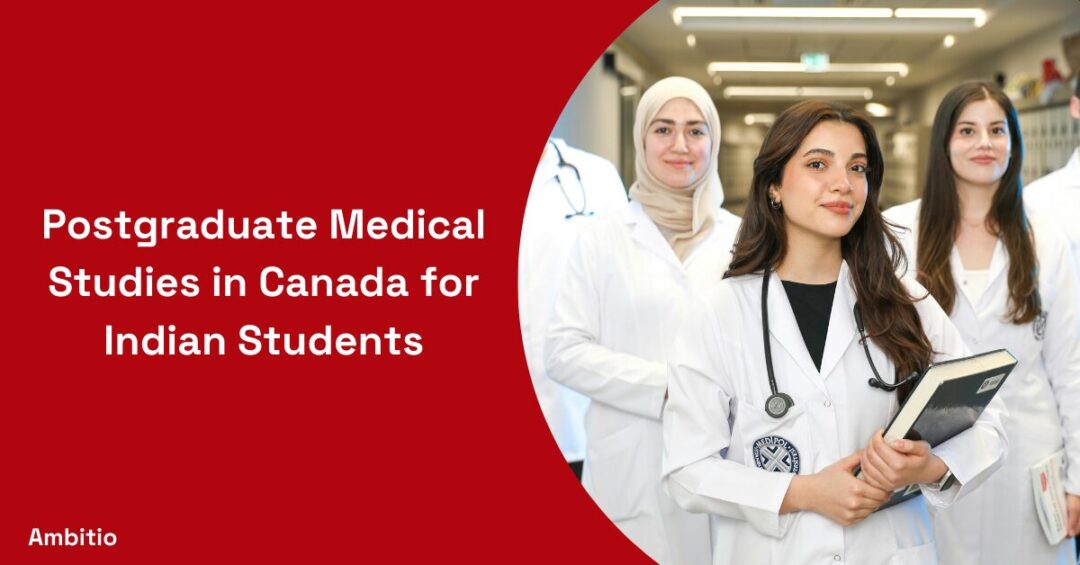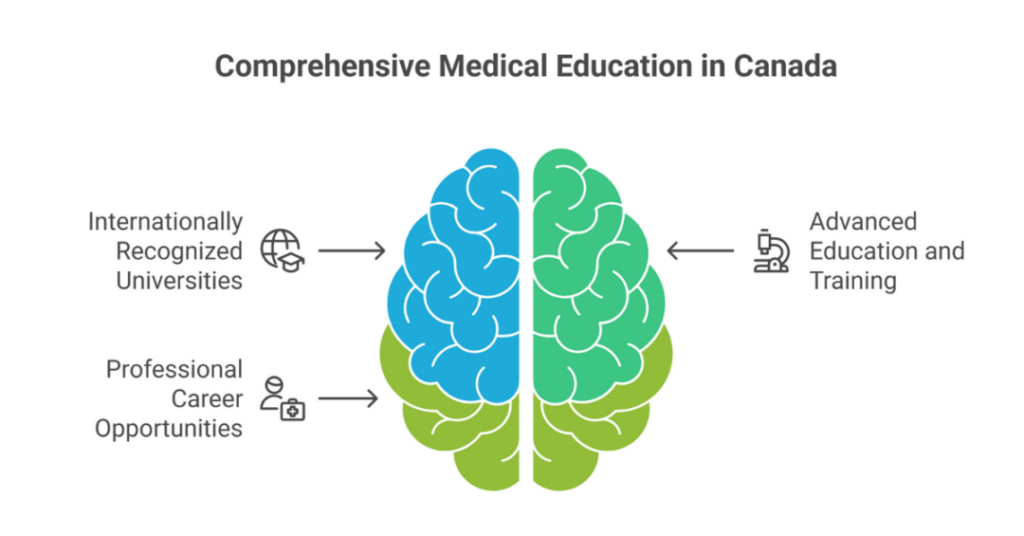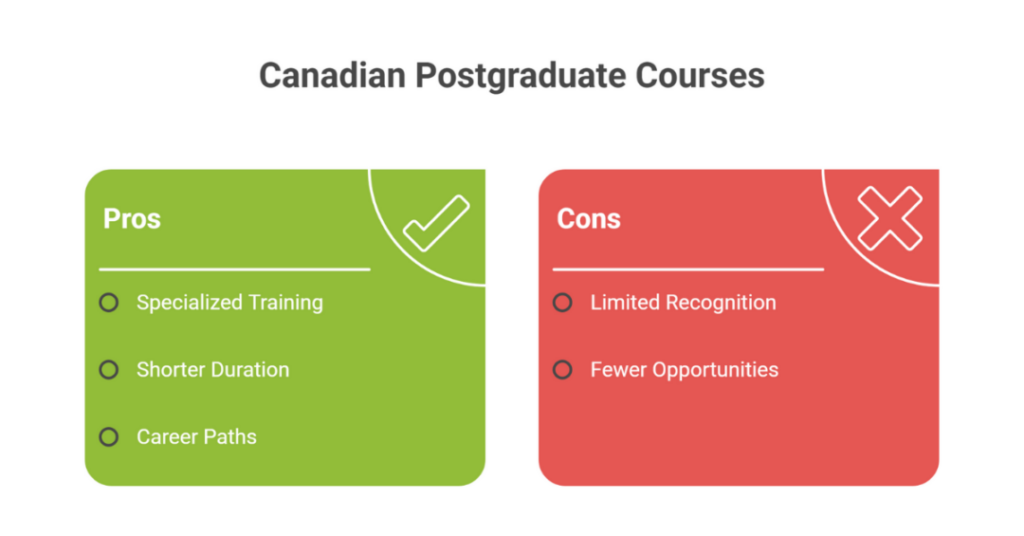27 August 2025
5 minutes read
Postgraduate Medical Studies in Canada for Indian and International Students: Postgraduate Medicine and Medical Studies Course in Canada

Key Takeaways
- Postgraduate medical studies in Canada for international students open doors to prestigious medical schools and career opportunities in the global healthcare industry.
- Postgraduate medical studies in Canada for international students include MD, diplomas, and specialized programmes in diverse areas of medicine.
- Postgraduate medical studies in Canada for international students ensure structured admissions, affordable tuition fees, and pathways to practice medicine in Canada.
Canada provides an unparalleled opportunity for international students seeking to fulfill their aspirations for postgraduate medical education.
Through its internationally recognized study abroad MBBS universities, advanced education and training, and professional career opportunities in the healthcare sector, the experience with postgraduate medicine in Canada ensures knowledge and competencies equip students to work in medical fields around the world.
What are the Different MD Programs in Medical Courses for International Students in Canada?
Did you know that the typical Doctor of Medicine Program in Canada varies in length based on the university? It typically takes 3-5 years to complete. There are also a variety of medical courses in Canada that will give international students the application of knowledge and experience that takes an objective hands-on & classroom mix of clinical application/practice.

Here are some programs major MD Programs that you can pursue:
- Doctor of Medicine (MD): For an internationally recognized medical degree from one of our reputable medical schools/universities upon graduation that qualifies you to practice in Canada.
- Family Medicine Residency: Specifically for students who want to work specifically in family and health care delivery.
- Specialized MD Programs: Some specialized medicine courses in Canada are related to internal medicine and pediatrics and surgery i.e. background focused area of medicine.
The students will compare the programmes regarding details, fees and course structure before they can decide where they will apply. Most of these courses take place in the fall, so plan ahead and check the program fees because the institutions will differ.
Table: Overview of MD-Programs in Canada
| Program Name | Duration | Focus Area |
|---|---|---|
| Doctor of Medicine (MD) | 3-5 years | General Medicine |
| Family Medicine Residency | 2 years | Family Healthcare |
| Specialized MD Programs | 3-5 years | Various Specializations |
Why Pursue Graduate Certificate and Advanced Diploma Medical Courses in Canada for International Students?
Here’s an interesting fact – other than the MD, Canada also offers unique postgraduate courses like graduate certificates and advanced-diplomas. These courses provide opportunities for international students to learn skill areas while studying without having to go through the full program of a medical degree.
The interesting aspect of these courses are:
- Specialized Training: To improve on-expertise, students must still complete specific courses in medicine like health sciences or translational medicine.
- Duration: Graduate diplomas can be completed in one year – which can reduce the cost of studying.
- Career Paths: These MBBS-programs in Canada provide various pathways to work in the healthcare industry for those wanting to continue their studies.
How to Get into the Top Medical Colleges in Canada for International Students?
Interestingly enough, medical education in Canada is considered one of the most selective and competitive education programs in the world. The admission process is established and achievable through the right preparation.
The key steps for students to take are:
- Academic Strength: Completion of a bachelor’s degree in health sciences or a similar medical science, showing a college GPA well above the minimum requirements to be competitive.
- Entrance Tests: The language studies of IELTS or TOEFL, the MCAT or GRE, or the SAT depending on the college or program.
- Supporting Documents: Transcripts, a letter of recommendation, a personal statement, a resume, and a statement of purpose.
Table: The essentials needed to for admission to the top medical colleges in Canada:
| Requirement | Details |
| Academic Qualification | Completed, at minimum, two years in a bachelor’s degree. |
| Exams Accepted | IELTS, TOEFL, GRE, SAT, MCAT |
| Application Type | Online application |
| Supporting Documents | GPA, transcripts, SOP, LOR, resume |
Top Universities for Postgraduate Medical Studies in Canada for International Students
Did you know that some prestigious medical schools universities in Canada are ranked as some of the best in the world? International students planning to obtain a medical degree in Canada can have the choice from these universities that offer postgraduate medicine and medical studies.
1. University of Alberta
The University of Alberta offers a medical degree in health sciences. Along with transcripts, IELTS/TOEFL scores and letter of recommendation must also be submitted.
2. University of British Columbia
The University of British Columbia offers a postgraduate medicine pathway in medicine and medical sciences. Document submissions include GPA, personal statement, IELTS/TOEFL.
3. University of Toronto, Ontario
The University of Toronto offers a doctor of medicine program. SOP, GPA, IELTS, recommendation letters must be submitted.
4. University of Windsor
The University of Windsor offers postgraduate field studies in the medical field. The application must include transcripts, resume and IELTS/TOEFL.
5. Memorial University of Newfoundland
Memorial University in Newfoundland has a specialisation in family medicine. Students will need to submit a personal statement, GPA, transcripts and IELTS.
Table: Top Universities, Required Documents and Examinations.
| Sl No | University | Documents Required | Exams Needed |
| 1 | University of Alberta | Transcripts, LOR, IELTS/TOEFL | IELTS, TOEFL |
| 2 | University of British Columbia | GPA, SOP, IELTS/TOEFL | IELTS, TOEFL |
| 3 | University of Toronto, Ontario | GPA, SOP, LOR, transcripts | IELTS, GRE, SAT |
| 4 | University of Windsor | Resume, transcripts, IELTS/TOEFL | IELTS, TOEFL |
| 5 | Memorial University of Newfoundland | GPA, transcripts, personal statement | IELTS, MCAT |
Can You Pursue Care Paramedic and Translational Medicine at Universities Offering MD in Canada?
Fun fact: Beyond MD medicine, MBBS in Canada includes care paramedic and translational medicine. These programs in Canada are unique programs that teach students to work in new areas of medicine.
Some highlights include:
- Care Paramedic Programs: Medical programs to teach advanced emergency response to care paramedics.
- Translational Medicine: Connects lab breakthroughs with medicines practiced in the field in Canada.
- Industry Immersion: Programs designed for students to take on roles in the industry after graduating.
Table: Specialty Medicine Programming
| Program | Duration | Focus |
| Care Paramedic | 1-2 years | Emergency and Health Response |
| Translational Medicine | 1-2 years | Medical Research to Practice |
What is the Eligibility Criteria at Universities in Canada?
Fun fact: if you are a student pursuing an MD or a master’s in medicine, you must be eligible to study. The eligibility is widely different, yet it is important to look to see what your specific requirements will be.

Table: Eligibility Criteria for Medical Courses in Canada
| Requirement | Details |
| Academic Background | Bachelor’s degree in health sciences/medical field |
| GPA Requirement | 3.0+ on a 4.0 scale |
| English Proficiency | IELTS 6.5+, TOEFL 90+ |
| Supporting Documents | SOP, transcripts, LOR, resume |
Conclusion
Postgraduate medicine and medical studies in Canada provides the possibility to practice medicine with a license globally, an opportunity for higher studies, and a career in the healthcare industry in Canada.
By having an excellent medical school, many programs, and a very clear admissions eligibility process to apply, Canada is certainly a top choice for international students.
Contact Ambitio today to begin your path to practicing medicine in Canada.
FAQs
What are postgraduate medical studies in Canada for international students?
Postgraduate medical studies in Canada for international students include MD programs, advanced diplomas, and certificates in medicine, offering high-quality medical education and training in world-class universities.
How long do postgraduate medical studies in Canada for international students take to complete?
The duration of postgraduate medical studies in Canada for international students usually ranges from 3–5 years for MD programs, while graduate certificates and diplomas may take 1–2 years.
What is the admission process for postgraduate medical studies in Canada for international students?
The admission process for postgraduate medical studies in Canada for international students involves an online application, submission of transcripts, GPA, IELTS/TOEFL scores, statement of purpose, and letters of recommendation.
What are the tuition fees for postgraduate medical studies in Canada for international students?
Tuition fees for postgraduate medical studies in Canada for international students vary by program and university, with course price ranging from CAD 20,000 to CAD 60,000 per year.
Can I practice medicine after postgraduate medical studies in Canada for international students?
Yes, international students who complete postgraduate medical studies in Canada for international students can practice medicine in Canada after fulfilling licensing requirements set by the Medical Council of Canada.
Which exams are required for postgraduate medical studies in Canada for international students?
Common exams for postgraduate medical studies in Canada for international students include IELTS, TOEFL, GRE, SAT, and MCAT, depending on the chosen medical degree and university.
Why should I choose postgraduate medical studies in Canada for international students over other countries?
Postgraduate medical studies in Canada for international students offer access to prestigious medical schools, globally recognized degrees, affordable tuition fees, and opportunities to gain permanent resident status.

You can study at top universities worldwide!
Get expert tips and tricks to get into top universities with a free expert session.
Book Your Free 30-Minute Session Now! Book a call now




























